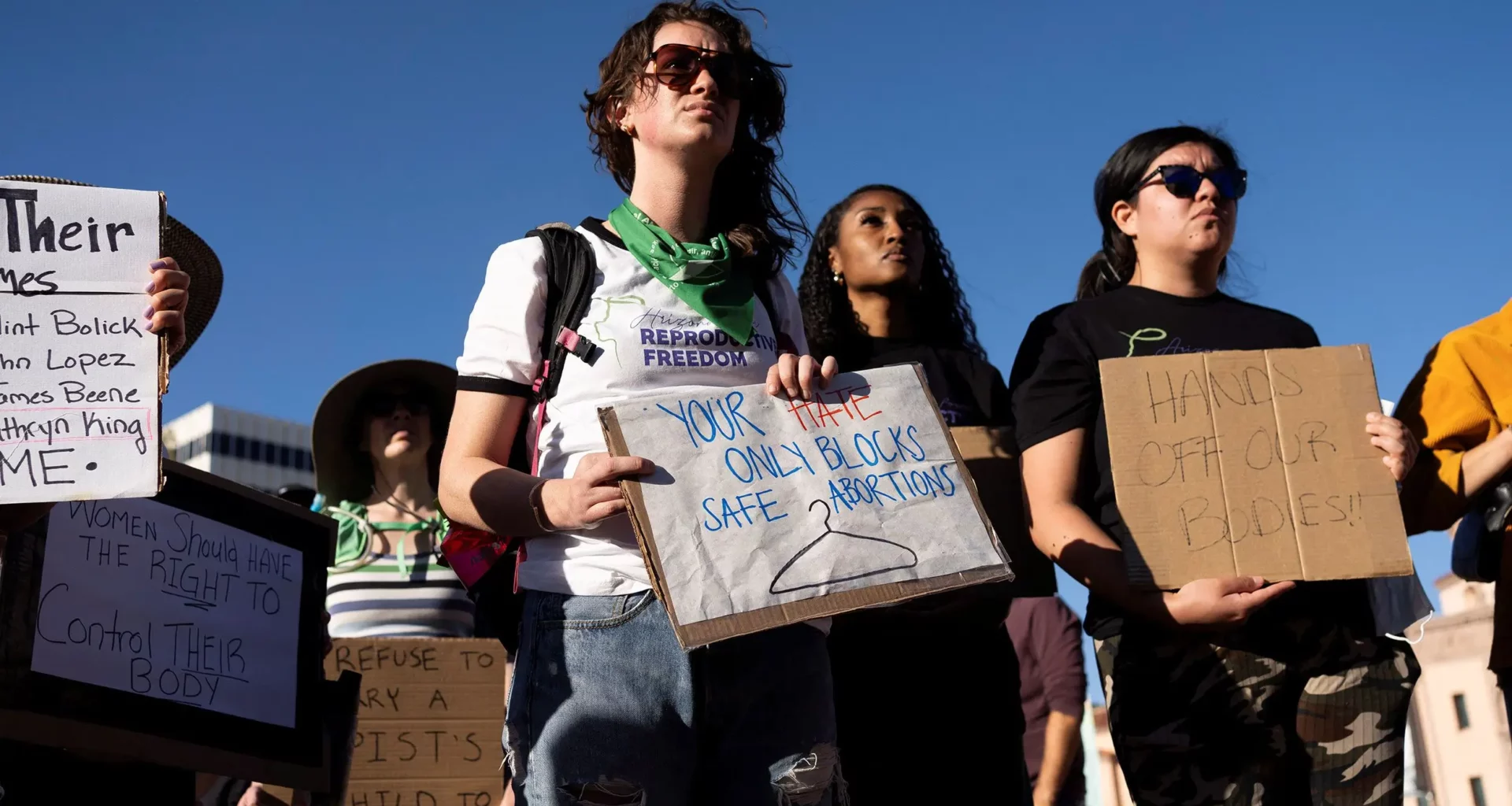Arizona’s abortion laws in 2024 have become a complex battleground. A recent court ruling and subsequent legislative actions have created a state of flux regarding access to abortion services. This article provides a comprehensive overview of the current situation as of June, 2024.
A Resurfaced 1864 Law: Near-Total Abortion Ban
In April 2024, the Arizona Supreme Court ruled that a pre-territorial abortion ban from 1864 could be enforced. This law prohibits abortion in almost all circumstances, with the only exception being to save the life of the mother.
The 1864 law does not include exceptions for rape or incest [Al Jazeera]. This ruling sparked outrage from reproductive rights advocates who argued that the law is outdated and a severe restriction on women’s healthcare.
Legislative Response: A Repeal Bill and Ongoing Legal Challenges
The Arizona legislature responded swiftly to the court’s decision. In May 2024, Governor Katie Hobbs signed House Bill 2677, which repealed the 1864 abortion ban.
However, this repeal faces a hurdle: it won’t go into effect until 91 days after the state legislature adjourns [Arizona Attorney General’s Office]. This puts the effective date sometime in late August or early September 2024.
In the meantime, legal challenges to the 1864 law are ongoing. Arizona Attorney General Kris Mayes has filed motions to prevent the law’s enforcement. Additionally, the ACLU of Arizona is challenging the law in court [ACLU of Arizona]. The ultimate outcome of these legal battles remains uncertain.
A Temporary Stay on Enforcement
Adding another layer of complexity, the Arizona Supreme Court granted a motion to temporarily stay the enforcement of the 1864 law until at least September 27, 2024 [ACLU of Arizona].
This temporary stay provides a window of access to abortion services, but its impermanence creates anxiety and uncertainty for women seeking abortions and healthcare providers.
Dates and Actions in Arizona’s Abortion Law (as of June 15, 2024)
| Date | Action | Outcome |
|---|---|---|
| April 9, 2024 | Arizona Supreme Court Ruling | 1864 abortion ban deemed enforceable |
| May 2, 2024 | Governor signs House Bill 2677 repealing the 1864 ban | Repeal to take effect after 91 days of legislative adjournment |
| May 13, 2024 | Arizona Supreme Court grants temporary stay | Enforcement of 1864 ban delayed until September 27, 2024 (or later) |
Uncertainties and Potential Scenarios for the Future
The future of abortion access in Arizona remains unclear. Here are some potential scenarios:
- The Repeal Takes Effect: If legal challenges are unsuccessful, and the repeal bill stands, abortions will likely become legal again in Arizona sometime in late August or early September 2024, with restrictions likely determined by pre-1864 laws.
- The 1864 Ban Takes Effect: If the repeal bill is overturned or the court allows the 1864 ban to go into effect, Arizona will have one of the most restrictive abortion bans in the nation. This would likely lead to further legal challenges and increased reliance on out-of-state abortion services.
- Legislative Changes: The Arizona legislature could potentially pass new abortion legislation in the future. This could involve restrictions on abortion access, even if the 1864 ban is repealed.
Impact on Women’s Health and Access to Services
The current situation in Arizona creates significant challenges for women seeking abortions. The temporary stay provides a limited window of access, but the potential return of the 1864 ban could force women to travel out of state or resort to unsafe methods.
This could disproportionately impact low-income women and women of color who may face greater financial and logistical hurdles in accessing out-of-state care.
Resources for Women in Arizona
Despite the uncertainties, there are resources available to women in Arizona:
- Planned Parenthood: Planned Parenthood offers a variety of reproductive healthcare services, including abortion services (depending on the legal landscape).
- ACLU of Arizona: The ACLU provides legal resources and information about abortion rights in Arizona.
- National Network of Abortion Funds: This organization provides financial assistance to women seeking abortions.
- Abortion Finder: This website provides information about abortion clinics and services in Arizona and surrounding states.
The Importance of Staying Informed and Engaged
The ever-changing legal landscape surrounding abortion access in Arizona necessitates staying informed and engaged. Here are some ways to do so:
- Follow Reputable News Sources: Stay updated on the latest developments by following reliable news sources that report on legal and legislative issues surrounding abortion in Arizona.
- Sign Up for Alerts: Many advocacy groups like Planned Parenthood and the ACLU offer email alerts or social media updates on the latest developments regarding abortion rights in Arizona.
- Contact Your Elected Officials: Voice your concerns about abortion access to your state legislators and federal representatives. Let them know where you stand on this issue.
- Support Advocacy Groups: Donate or volunteer your time with organizations working to protect reproductive rights in Arizona.
Looking Ahead: A Call for Advocacy and Action
The future of abortion access in Arizona hinges on a combination of legal battles, legislative actions, and public pressure. With continued advocacy and a strong push for reproductive rights, Arizona may see a future where safe and legal abortion services are accessible to all women.
Additional Considerations:
- The Impact on Providers: The uncertain legal environment creates challenges for healthcare providers. Confusion over the legality of abortion services may lead to hesitation or a reluctance to offer them. Advocating for clear and accessible abortion laws can help protect providers and ensure women have access to necessary healthcare.
- The Potential for a Ballot Initiative: There’s a possibility that a ballot initiative addressing abortion access could be presented to Arizona voters in the future. Staying informed about such initiatives and voting efforts allows individuals to participate in shaping the future of abortion rights in the state.
Conclusion
Arizona’s abortion laws in 2024 are in a state of flux. While the current situation presents challenges, it also highlights the importance of ongoing advocacy and public engagement.
With continued efforts, Arizona may move towards a future where women have safe and legal access to abortion services. It’s crucial for individuals to stay informed, support relevant organizations, and make their voices heard to advocate for reproductive rights in Arizona.






